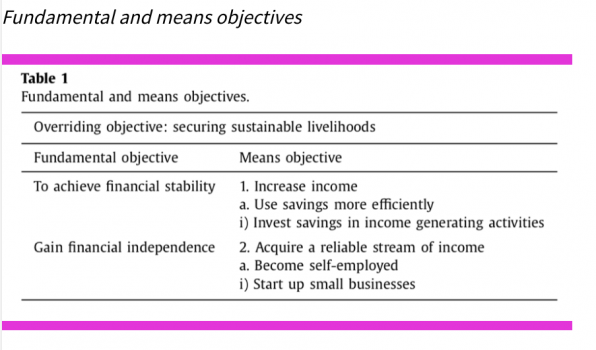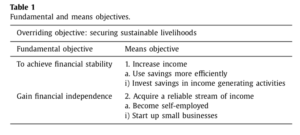Introduction
The Word of God provides instructions to us who are Christian believers and are called to the apostolic mission field to fulfil our divine assignments. My journey to fulfil the apostolic call started in 1995 with the giving of three painted river rocks. One was painted with the flag of Kenya, the second, the flag of Jamaica, and the third, the flag of Swaziland. In 2014 Eden Citadel Empowerment Association (“Eden”) was launched in Nairobi and Rongo, Kenya. The organization aims to empower single women and widows to conduct business based on biblical principles. Eden’s purpose is to respond to the scripture: “He called ten servants of his, and gave them ten minas, and told them, “Conduct business until I come”” (Luke 19:13, Word English Bible Version). In 2015, 33 women and two men graduated from Eden’s business school and launched out into the Kenyan marketplace.
Organization’s Mission
Eden’s mission statement is: Conquer poverty by overcoming barriers that deny disadvantaged persons access to equitable earnings. Our pillars are based on the 3-Es: Educate, Equip, and Empower. Our primary goals are to open doors to sustainable personal income in depressed/disadvantaged communities, and to educate, equip and empower people living in poverty with tools for self-sufficiency. Eden’s core beliefs are:
- Thoughts born of culture, ignorance and fear become the greatest barrier to success and perpetuate the cycle of poverty.
- Women in communities with limited earning power and the primary responsibility for providing for their family are the priority.
- Every approach must be crafted to meet the cultural dynamics of the community (economical, spiritual and social) that result in disparate opportunities for income generation and that provide opportunities for change. Faith-based partnerships are often the most viable means of reaching under-served communities.
- Solutions must be demand-based and sustainable based on the economy and projected job growth within the target community.
Although there are barriers to women starting and establishing successful micro-enterprises in Kenya, research findings are that female entrepreneurs are gaining opportunities and overcoming these barriers. In fact, Kenya is becoming a model for female micro-enterprise success (Lock & Smith, 2016). Lock and Smith suggested that Kenyan leaders need to create and provide policies, regulations, business training, financial support, and mentoring programs to better support female entrepreneurs. Eden helps to fill some of that gap by providing business management courses as well as leadership training to the women. Eden differentiates itself because the courses, training, and services are grounded in biblical principles.
In 2017 an ethnographic study was done in the slums of Nairobi to examine the unequal access to resources because of gender. In the study the women formed collectives and partnered with community organizations to overcome barriers (Mwiti & Goulding, 2017). Based on the study Mwiti and Goulding outlined means to achieve some fundamental economic objectives (Table 1). To achieve financial stability and to gain financial independence there must be increases in income, savings and investments, and reliable, sustainable income streams.
Table 1
Fundamental and means objectives
Note. Reprinted from “Strategies for Community Improvement to Tackle Poverty and Gender Issues: An Ethnography of Community Based Organizations (‘Chamas’) And Women’s Interventions in The Nairobi Slums”, by Mwiti, F., & Goulding, C., 2017. European Journal of Operational Research.
Impact of International/Global Challenges
Eden’s goal of providing education to support the development of micro-enterprise opportunities were met with some challenges. These challenges include culture, finding qualified and trustworthy leadership, financial constraints, international logistics, and infrastructure barriers. Researchers such as Grigsby, Jeanetta, and Jivetti (2015) also wrote about these challenges. Challenges were faced in operating the organization from a United States (U.S.) base due to having expectations that the rules of operation and engagement in Kenya were the same as in the U.S. To mitigate the risks and challenges the organization’s operations were modified to follow Kenyan laws and registration requirements. Another major challenge was identifying, ensuring, and maintaining trustworthy leadership. Because of the corruption that is acceptable in Kenyan culture and the lack of checks and balances between me in the U.S. and the leaders in Kenya, the situation resulted in a lack of trustworthy leaders managing the operations in Kenya. Assumptions were made by me that because the leadership in Kenya were clergy there would be more trustworthiness, however, that was not the case.
Opportunities on the Larger Academic or Research Community
How does or can Eden contribute to the larger academic or research community? Because of the religious core of Eden’s existence there is the potential to shape the socio-economic culture of the Kenyan society. Research showed that religion significantly shapes society, and therefore impacts entrepreneurial efforts within the society (Dodd & Seaman, 1998). Christian apostolic marketplace leaders who understand their influence in the society and marketplace can have a significant impact on women entrepreneurs in Kenya. Religion can strengthen entrepreneurship, and the Christian faith supported by biblical teachings provides the principles to greatly influence economic ventures. Additionally, religious beliefs influence management decision-making related to maximizing profits, operating the enterprise so that it positively impacts and add value to its community; and contributing to the common good of the people in the community. Towards that end, there is opportunity for future research to better understand the relationship between Christian beliefs, Christian practices, biblical principles, and their impact on economic enterprises (Dodd & Seaman, 1998; Stebbins, 1997).
Conclusion
Eden’s mission is clear: Conquer poverty by overcoming barriers that deny disadvantaged persons access to equitable earnings. The financial, leadership, international geographic logistics, and infrastructure challenges are also very real. Regardless of the challenges and barriers, there are opportunities to integrate biblical teachings and principles to conduct business in trustworthy ways and to not let greed, poverty, oppression, gender biases, and loss of opportunity determine an individual’s or society’s economic success or failure. Research and academic opportunities are also preset and can be assessed based on Eden’s members lived experiences. Understanding the impact of religion on business decision-making is a research opportunity that adds value to the global marketplace. There is also potential, based on positive findings, to apply lessons learned in an academic setting by developing a curriculum that incorporates supporting scriptures in the teachings.
Dodd, S. D., & Seaman, P. T. (1998). Religion and Enterprise: An Introductory Exploration. Entrepreneurship: Theory & Practice, 23(1), 71-86. Retrieved from http://journals.sagepub.com/loi/etpb
Grigsby, M., Jeanetta, S., & Jivetti, B. (2015). Benefits and challenges of micro-enterprise participation: women’s cottage industry in Kaimosi, Kenya. Development in Practice, 25(8), 1146-1159. doi:10.1080/09614524.2015.1081675
Lock, R., & Smith, L. H. (2016). The impact of female entrepreneurship on economic growth in Kenya. International Journal of Gender & Entrepreneurship, 8(1), 90. doi:10.1108/IJGE-11-2015-0040
Mwiti, F., & Goulding, C. (2017). Strategies for community improvement to tackle poverty and gender issues: An ethnography of community based organizations (‘Chamas’) and women’s interventions in the Nairobi slums. European Journal Of Operational Research, doi:10.1016/j.ejor.2017.12.009
Stebbins, J. M. (1997). Business, faith and the common good. Review of Business, 19(1), 5. Retrieved from https://www.stjohns.edu/academics/schools-and-colleges/peter-j-tobin-college-business/college-faculty/review-business-journal.


